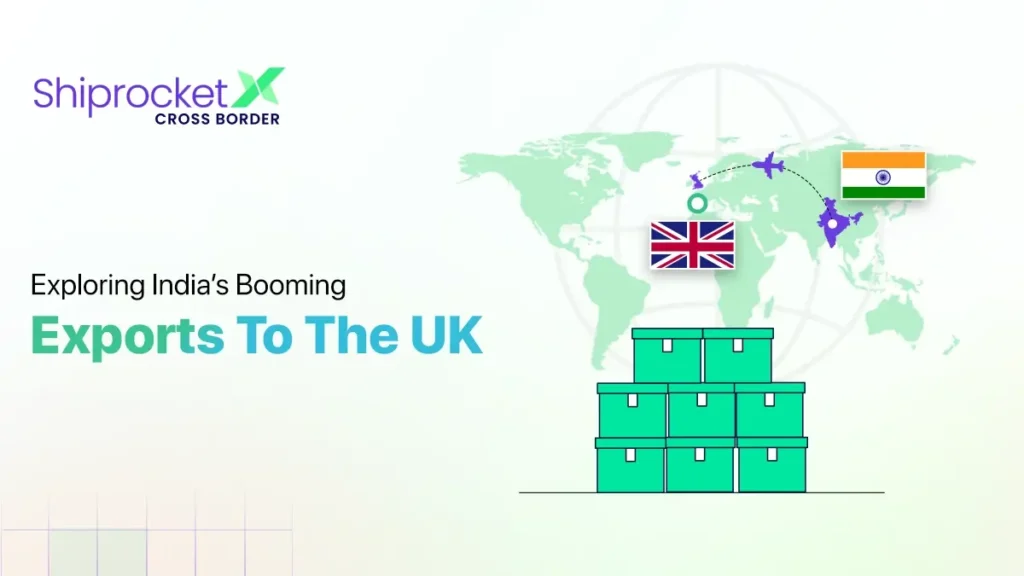10 Best Selling Indian Products in UK
India and the UK market share a strong trading relationship that has evolved over the years. India is known for its wide production capabilities and diverse service sectors, which export a wide range of products like pharmaceuticals, textiles, machinery, etc. to the UK and other international markets. As of 2023, India has exported around USD 345 billion to the UK markets, an increase of 11.4% from the previous years. This increase in exports from India to the UK markets reflects that India is one of the largest trading partners of the UK, and both countries are mutually economically dependent on each other. This blog further explains the situation of India’s exports to the UK, the impact of free trade agreements, the best-selling Indian products in the UK, and some strategies that can increase export success.

Import to the UK: What Statistics Say?
India is one of the largest countries and is well known for its production and service sectors. Indians from rural areas still depend on agriculture as their primary source of income, whereas Indians from urban areas are working in different industries like IT, food processing, jewellery, transport, import, export, etc. India exports several items globally, for instance, India imported goods worth 2.4 trillion to the UK, which was 11.2% higher than that in 2022.
India is one of the top trading partners of the UK outside the European Union. 5% of India’s exports of textiles and apparel are to the UK, which reflects that Indian textiles are high quality and affordable. Other than textiles, pharmaceuticals are another major export to the UK, valued at over INR 1000 crore highlighting India as a major supplier of general medicines to the UK. India also exports approximately 6% of its machinery and transport equipment to the UK. India’s craftsmanship is also famous, as around 10% of India’s jewellery and gem exports are to the UK. These figures show the significant trading relationship between India and the UK, with their own histories, strategic partnerships, and market demands.
Free Trade Agreement Between India and the UK
A free trade agreement (FTA) between India and the UK is being implemented to strengthen the economic relationship in the post-Brexit era. The FTA has also enhanced the economic relations between these two countries by minimising the trading restrictions, promoting investment, and developing a closer economic relationship. India is an important trade partner for the UK as it seeks to establish independent trade policies outside the European Union. The UK is also an important trade partner destination for India for its exports, investments, and technological cooperation. The main objectives of the FTA between India and the UK are:
- The FTA is focused on reducing tariffs on a wide range of goods like textiles, pharmaceuticals, agricultural products, automated parts, electronics, etc. This will make Indian products more competitive in the UK market and increase their demand.
- An increase in trade and investment due to the FTA will increase job opportunities for people in different sectors, like exports of Indian textiles, apparel, manufacturing sectors, etc.
- The FTA will allow better access to each other’s markets for IT services, financial services, legal services, healthcare, etc.
- This agreement will protect each other’s investments, creating a suitable environment for the investors to stay transparent.
- FTAs can also promote foreign direct investment (FDI) flow between the UK and India.
- Consumers in both countries will be getting goods and services at lower prices because of the removal of tariffs on products and services.
- FTA is focused on including rights for labour, environmental protection, sustainable development, etc., to make sure there is constant economic growth without compromising on social and environmental standards.
10 Premier Products Exported to the UK From India
There are many products exported from India to the UK and other countries. However, the 10 premier products that are exported to the UK from India are as follows:
- Textiles and apparel
Textiles and apparel are some of the key products exported to the UK from India. In 2023, India exported around INR 554 crores of textiles and apparel to the UK market, which is approximately 20% of India’s total exports. The export of textiles and apparel includes cotton textiles, ready-made garments, home textiles, silk and woollen textiles, synthetics, etc. The demand in UK markets is expected to grow at a rate of 8–10% annually for Indian textiles and apparel, as it is proven to be cost-effective and accessible because of the FTA between the UK and India.
- Pharmaceuticals
Pharmaceuticals account for around 6% of India’s total exports to the UK and play an important role in the sector of bilateral trade. In 2023, India’s pharmaceutical exports were valued at approx. INR 4,700 crore. The types of pharmaceuticals exported to the UK market primarily include general drugs, active pharmaceutical ingredients, over-the-counter medicines, vaccines, special medicines, etc.
- Traditional handicrafts
India is the largest exporter of traditional handicraft items in many countries, including the UK. In 2023, traditional handicraft exports from India to the UK were of significant cultural and economic exchange between the two countries. There was a total export value of 360 crores of traditional handicrafts, including textile handicrafts, wooden handicrafts, metalware, pottery, ceramics, jewellery, etc.
- Machinery and mechanical appliances
The most commonly exported machines and appliances include machinery used in manufacturing, construction, agricultural machinery like tractors and harvesters, construction appliances like cranes and excavators, textile machinery, medical equipment like surgical tools, diagnostic tools, etc. India exported machinery valued at around 400 crore in 2023 to UK, which is approximately 6-8% of the overall export portfolio.
- Gems and jewellery
India exported gems and jewellery worth around INR 2,337 crore to the UK in 2023, which is approximately 10% of the total export value. The UK market has a high demand for high-quality Indian diamonds, gold jewellery, and precious gems and stones. In recent years, India has become one of the leading and most promising exporters of gems and jewellery worldwide.
- Organic chemicals
Organic chemicals like pharmaceutical intermediates, agrochemicals, fragrances, flavours, dyes, pigments, etc. will contribute approximately INR 3,470 crores to India’s earnings from exports to the UK in 2023. The export of organic chemicals from India to the UK has been growing at a rate of about 5-7% annually over the past few years. Indian exporters are also complying with the regulatory standards and quality controls required by the UK to make sure that the products they are exporting meet safety and environmental standards.
- Leather products
India’s leather products exports to the UK in 2023 were valued at around INR 4,700 crores, which is 5–7% of the total export portfolio. Indian leather products meet the demands of the UK market to deliver high-quality, fashionable, and durable leather products like leather footwear, jackets, coats, handbags, furniture, luggage, skirts, trousers, belts, gloves, etc. Indian exporters are now adopting environmentally friendly practices and certifications to meet the growing demand for sustainable and ethically sourced leather products.
- Food products
India exports various food products to the UK market, including spices, tea, coffee, pickles, ready-to-eat meals, rice, wheat, lentils, cumin, beans, etc. In 2023, India’s exports of food products were around INR 120 crore, which is a notable portion of India’s total exports to the UK. The demand for food products in the UK market is growing and supported constantly by cultural diversity, consumer demand, and suitable trade agreements.
- Mineral fuels and oils
Mineral fuels and oils are significant exports from India to the UK, meeting the energy needs of the UK economy. Mineral fuels and oils like crude oil, refined petroleum, coal, coke, natural gas, liquefied natural gas, compressed natural gas, etc. are mainly exported to the UK market from India. In 2023, fuels and oils valuing approximately INR 250 crores were exported to the UK from India, which is around 20–25% of the overall export portfolio.
- Plastics
India exports a variety of plastic products to the UK, like polyethylene, polystyrene, plastic packaging bags, bottles, containers, household goods, utensils, toys, automated parts, industrial components, etc. In 2023, India’s exports of plastics and plastic products to the UK were worth INR 1500 crore. These plastic products are meeting the daily and diverse needs of the UK market, as they are used across various households and industries. The demand for plastic products is supported by diverse product offerings and reasonable prices.
Strategies for Successful Exports from India to the UK
Here are some strategies that can be followed for successful exports from India to the UK:
- Customisation and adaptation of the product: Exporters from India should customise their products as per the requirements and preferences of UK consumers. Adapting to the packaging techniques, labelling ways, and branding of the products in UK markets as per their regulations and consumers’s expectations will be beneficial for the exporters.
- Market research: Exporters should conduct market research and analysis in the UK market before launching their products to understand the demand, needs, preferences, and trends of the market.
- Quality assurance and certifications: It is important to make sure that the products meet the international quality standards and regulatory requirements of the UK market for them to be sustainable. The products should also have necessary certifications from BSI, ISO, CE, etc. to build trust with UK consumers.
- Digital marketing and e-commerce channels: Digital marketing strategies like the use of social media marketing, SEO, target marketing, etc., have become essential for e-commerce businesses to reach a greater audience in the UK market.
- After-sales support and services: After selling your product in an international marketplace, it is important to build a long-term relationship with the consumers to sustain the market. Providing after-sales customer support and services results in high customer satisfaction and loyalty. Make sure to address customer inquiries, feedback, and complaints effectively.
Streamline Your Exports to the UK with Assistance from ShiprocketX
Streamlining exports to the UK can be easy with the help of ShiprocketX, as it is a comprehensive shipping and logistics platform that simplifies the shipping process from India to the UK markets. ShiprocketX provides a user-friendly platform for booking shipments, tracking packages, and managing logistics without hassle.
Exporters can choose from multiple shipping carrier options provided by ShiprocketX as per cost, delivery time, service, quality, etc. No matter how big or small your shipment is, ShiprocketX will provide you with real-time updates and tracking, which further allows exporters to monitor their shipments and manage customers’ requirements and expectations effectively. ShiprocketX also helps exporters to export with minimal or automated shipping documents in compliance with UK customs and requirements, ensuring smooth customs clearance with no delays. There are cost management tools and insurance available that allow exporters to optimise their shipping expenses, losses, and damages by looking at different options.
For online exporters, ShiprocketX has integrated with major e-commerce platforms like Shopify, Magento, WooCommerce, etc. to streamline the order process. ShiprocketX has comprehensive services for exporters, which can help navigate them through the complexities of international trade without any hassle.
Conclusion
The export and import relationship between India and the UK complements both countries with economic strengths. With exports ranging from high-quality textiles to pharmaceuticals, handicrafts, etc., India meets the diverse needs of consumers in the UK market. The free trade agreement has further helped both countries by reducing trade barriers and promoting investments. Platforms like ShiprocketX have also helped Indian exporters streamline their processes of exporting with efficient shipments.
As India continues to develop and innovate to meet global market demands, its export portfolio to the UK will also continue to grow and foster economic prosperity in both countries.








